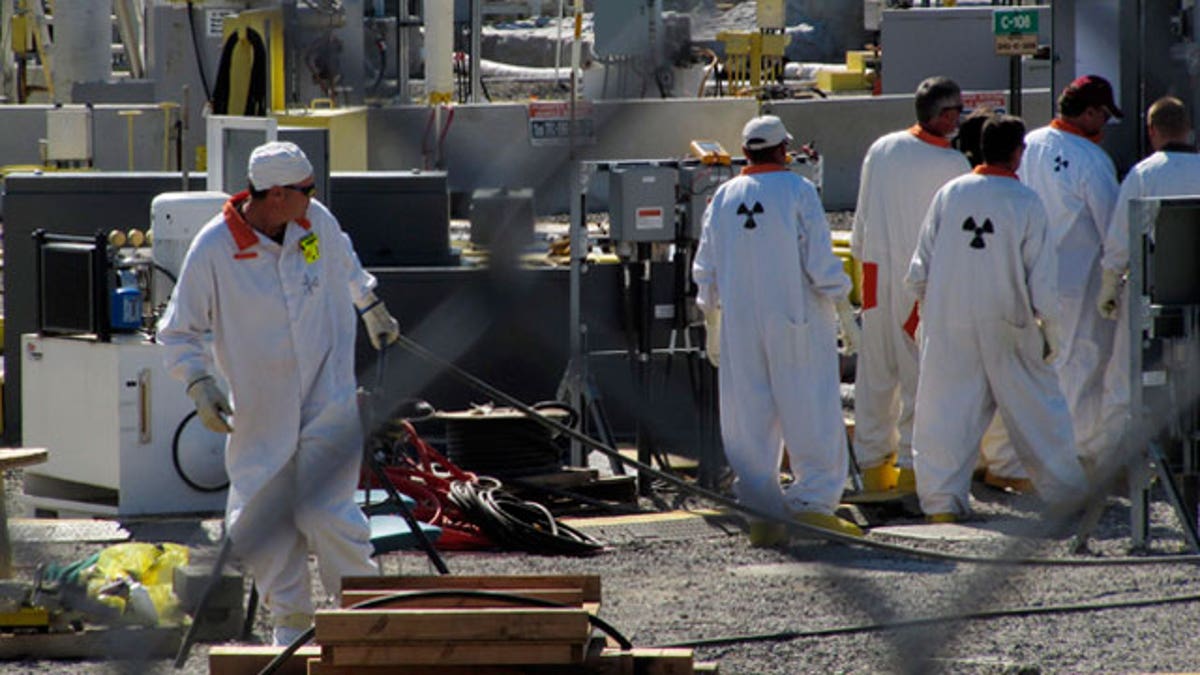
July 14: Workers at the Hanford nuclear reservation near Richland, Wash., work in a tank farm where highly radioactive waste is stored underground. A commission examining U.S. nuclear waste policies visited the site Wednesday. (AP)
RICHLAND, Wash. — The Hanford nuclear reservation is already the most contaminated U.S. nuclear site, and federal efforts to find a permanent place for all of the nation's radioactive waste shouldn't impede plans to clean it up, people from various backgrounds told a federal commission Wednesday.
The panel, appointed by President Barack Obama to examine U.S. nuclear waste policies, toured the Hanford site, heard from local advocacy groups and Northwest American Indian tribes about the need for cleanup.
The visit to south-central Washington was one of several planned around the country by the 15-member Blue Ribbon Commission on America's Nuclear Future. The group is charged with reviewing U.S. treatment, transportation and disposal of radioactive waste.
Obama called for creation of the commission following his decision not to proceed with Yucca Mountain, an underground waste repository proposed 90 miles northwest of Las Vegas. Highly radioactive waste from Hanford, which was created in the 1940s as part of the top-secret Manhattan project to build the atomic bomb, has long been intended for such a repository.
Commission members visited a field of underground tanks holding millions of gallons of highly radioactive waste and viewed construction of a massive waste treatment plant. They also walked a catwalk over a pool containing radioactive elements cesium and strontium, glowing pale blue in the building's darkness, intended for disposal in a repository.
A public meeting followed, where members of the Yakama, Umatilla, Nez Perce and Wanapum tribes welcomed the commission to their homelands but stressed the need to remove waste from Hanford. The tribes retain treaty rights to fish, hunt and gather roots there.
Hanford lands have always been important to the Nez Perce culturally and ceremonially, but those treaties have not always been honored, said Brooklyn Baptiste, the tribe's vice chairman. The commission has an opportunity to change that, he said.
"In less than one generation, Hanford has become so contaminated that my people will be living with the contaminated consequences for the next 10,000 years or longer," said Stuart Harris, director of the Department of Science and Engineering for the Confederated Tribes of the Umatilla in Oregon.
For more than 25 years, the Energy Department has pursued plans to bury at least 77,000 tons of highly radioactive spent nuclear fuel in Yucca Mountain. Estimates have projected the total cost at more than $90 billion, with $10 billion spent to date.
Opponents have raised concerns about contamination, and Obama made a campaign promise to kill the project, which was a longtime goal for the Nevada congressional delegation and Democratic Senate Majority Leader Harry Reid.
Obama in January appointed former Democratic Rep. Lee Hamilton of Indiana and former National Security Adviser Brent Scowcroft to head a commission to recommend alternatives.
Scowcroft stressed that the commission's mission is to identify a disposal path for radioactive waste, not site a repository.
A repository will "absolutely" be necessary, particularly for defense waste like that found at Hanford, said Ken Niles of the Oregon Department of Energy. But Oregon remains focused on ensuring that the waste already at Hanford is stabilized, he said.
"The Hanford site is not an appropriate location to take on any additional waste storage, waste disposal or waste generation missions," Niles said. "We're more than 20 years into a cleanup that now looks like its going to stretch 65 or 70 years before it's all complete."
Commission members also visited Columbia Generating Station, the Northwest's only commercial nuclear power plant, which is operated by the public power consortium Energy Northwest.
Northwest ratepayers have already paid $290 million into a national fund to build and operate the repository since the plant began commercial operation in 1984. Without a repository to store the waste, Energy Northwest has instead installed 27 canisters to hold used fuel bundles.
Washington state and South Carolina are suing to prevent the Yucca Mountain project from being abandoned. A Nuclear Regulatory Commission legal panel ruled last month that the Energy Department doesn't have the authority to kill the project started by Congress, but Nevada state and Energy Department officials have said they will appeal.









































